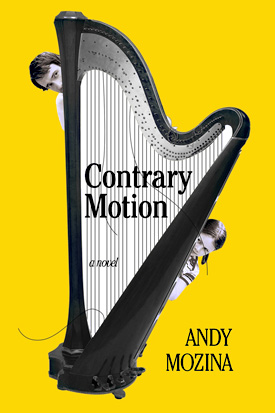
On a musical instrument, contrary motion refers to a melodic motion in which one series of notes rises in pitch while opposing notes descend. In his debut novel, Contrary Motion, English professor Andy Mozina moves his 38-year-old character, Matthew Grzbc, in opposite directions in most every aspect of his life.
As a harpist living in Chicago, Matthew hopes to land a chair position in a symphony orchestra—but his every day has him playing on demand to dying patients at a hospice and to the sounds of chewing at hotel brunches.
As a just-divorced man, he dates a woman with whom he suffers erectile dysfunction—even while he can’t stop lusting for his ex-wife who is about to become engaged to another man. He’s a devoted and attentive father to his six-year-old daughter—but the girl teeters on the verge of a breakdown after witnessing her father “in flagrante delicto” with her mother while Mom’s boyfriend is out of the house. Adding drama, Matthew’s father suffers a fatal heart attack while listening to a relaxing meditation CD—leaving his son questioning his sanity as well as his mortality. 
When a longed-for audition for a harpist in the St. Louis Symphony Orchestra opens career possibilities for Matthew (if only his harp would stop buzzing and twanging), he is pulled once again in opposing directions. To audition or not to audition? And, should he be offered the chair, to move or not to move away from his girlfriend, his ex-wife, his daughter, his life in Chicago?
Matthew’s saving grace, the glue to keep his life from splitting down the middle with all that contrary motion, is his sense of humor. It’s hard not to root for the guy between chuckles. He is as perfectly imperfect as are we all on those days when we take an honest look in the mirror. He is riddled with anxiety when most of his fears are never realized. By end of novel, all that anxiety becomes a tad exhausting—-get it right, Matt! Do it, dude!—-and then he does that, too, hitting the perfect note, humanly well.
Andy Mozina has taught English at Kalamazoo College since 1999. He is the author of the short story collections, The Women Were Leaving the Men, which won the Great Lakes Colleges Association New Writers Award, and Quality Snacks, a finalist for the Flannery O’Connor Prize. His fiction has appeared in numerous magazines, and he has received special citations in Best American Short Stories, Pushcart Prize, and New Stories from the Midwest. Mozina is also the author of a book of literary criticism called, Joseph Conrad and the Art of Sacrifice.
